Storybelly Digest #5
Rotary phones, a favorite poem, a garden walkabout, and the art of doing dishes
Good morning! To those who have been here an entire month (wow!) and to those just joining us, I see you! Thank you for hanging out here with me/us.
It feels good to check in with you every Monday morning, to see how’s-by-you? — as an ancient old friend used to say when she’d call me — on a rotary phone, no less, with a party line — who remembers party lines? My grandmother, the real Miss Eula, was famous in real life (and maybe she was in Love, Ruby Lavender as well), for her skill in picking up the phone where no one on the line could notice, when the ring-ring! on the incoming phone call was definitely not “her” specific ring, but she’d pick up the receiver anyway, quiet as could be, barely breathing, so she could listen in on the town gossip.
These days I’m moving toward ancient friend status, more every day, but I still might have another 30 (ha!) years on this knob, if I listen to Lloyd Kahn tell it. Here’s the link to his Substack, “Live From California.” Lloyd was the shelter editor for the Whole Earth Catalog in the Sixties, is 89 years old, turning 90 in a few weeks, and thinks he has another ten years in which to write the next book, to go back to Burning Man, to swim daily, to have fun, and to search for adventure.
I’ve just finished reading Lloyd’s occasional email newsletter, Gimme Shelter. That link is to Feb. 2024’s newsletter at Gimme Shelter and will give you good background, but the March 2025 newsletter I just read isn’t posted yet — if you’d like to read it, let me know and I will forward it to you. It includes his adventures at Burning Man in 2024! And many other fine insights, including his book The Half-Acre Homestead, which I’ve used for inspiration, here on my little half-acre, for years.
Another 30 years would make me 101. I’ll take it. Really. As someone who was afraid of dying all her young life, and wrote an entire book about it — no, more than that — who started three different novels with death (Ruby, Little Bird, and All-Stars), I’ve been figuring out death all my life, it seems. Trying to make friends with it.
And not just death in the physical sense, but the losses that feel like death, and are a death of another kind. The loss of home, of family, of youth, of opportunity, of health or hardiness, of friends, of time, of all the things we must let go of as we age and, one hopes, mature in understanding.
I have long held on to a guidepost poem for me by C.P. Cavafy titled “Growing in Spirit” although I always think it is titled “Half the House.”
He who hopes to grow in spirit
will have to transcend obedience and respect.
He will hold to some laws
but he will mostly violate
both law and custom, and go beyond
the established, inadequate norm.
Sensual pleasures will have much to teach him.
He will not be afraid of the destructive act:
half the house will have to come down.
This way he will grow virtuously into wisdom.
Working on it, Cavafy. Working on it.
I’m reading Richard Osman’s newest novel, We Solve Murders, which is full of completely fictional characters, and completely unbelievable situations, but who cares. The romp is funny and light and just what I need, she who wants to write a cozy mystery one day. Let’s write one together.
Libby tells me We Solve Murders is due back to my library in 7 hours and I am 56% through it. I have already put a hold on it so I can finish it the next time it appears in my inbox, although I am number 46 on the wait list. I will happily read/listen to other books while waiting. “Murderers! You can’t have ‘em all!” is the first line of Love, Ruby Lavender, who is familiar with murder. :>
We are watching Boardwalk Empire, our second-time through, but it’s been many years since we saw it last. The mafia story is secondary (or less) to me. In the mood I’m in, I find myself thinking about the writing, and how time and place is represented, and the passing of all these characters from 1920s Prohibition into history.
I felt the same way about Deadwood, although the plotting and the dialogue were so rich, I was swept into those episodes like I had ancient old friends there: Wild Bill, Calamity Jane, Al and Doc and Bullock (insane, truly) and Sol and Charlie Utter and Ellsworth, real historical people, now all gone.
It’s not a maudlin thought, not really, as there are such gifts along the way to becoming an ancient one, such signs that we do go on, in some way. I took these in a walkabout in my yard last week, as the dead of winter gave way to spring:
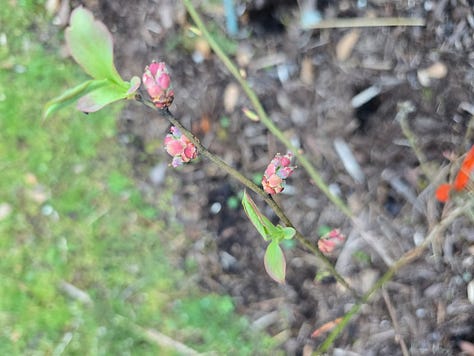
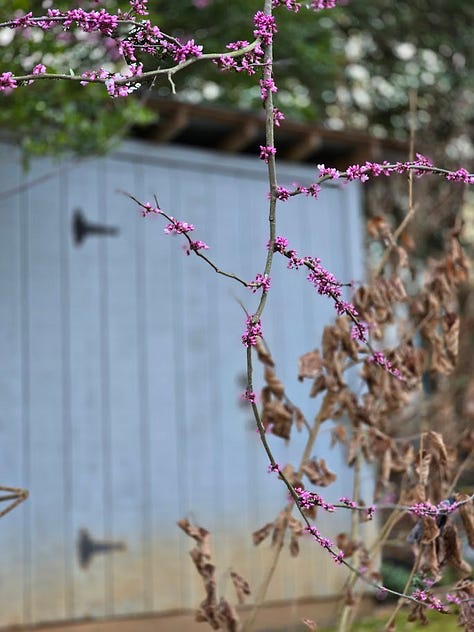
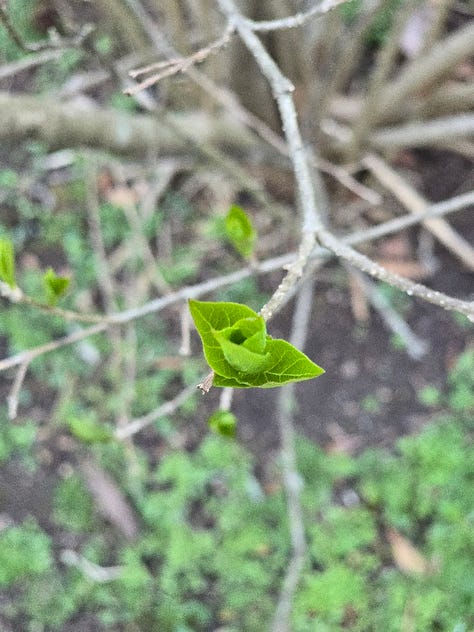
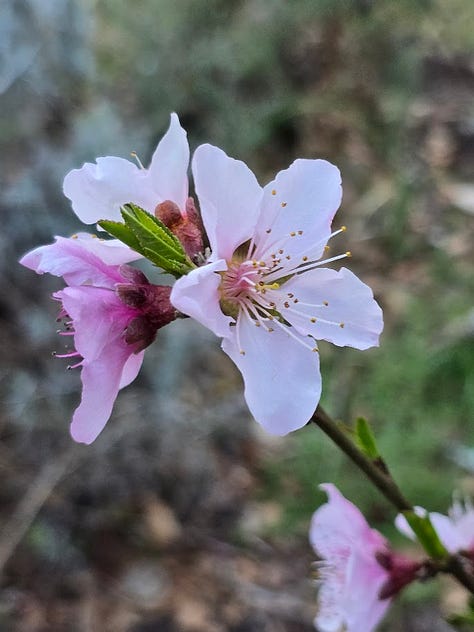
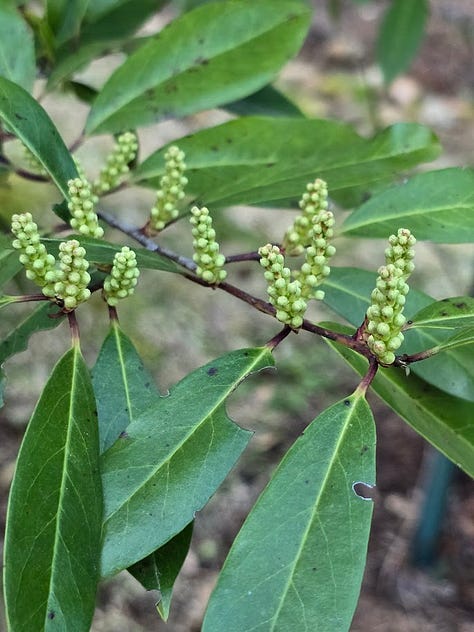
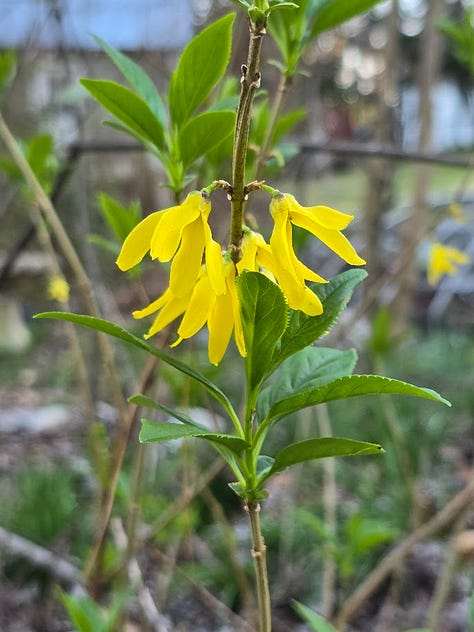
I want to say something clever here about awakening our writing with the coming of spring, but I feel thick this morning, after a welcome weekend full of family and good food (the two go hand-in-hand, yes?) and so much celebrating — spring, birthdays, seeds, good coffee, deep conversations, calendar-making decisions, and a realization that we may be past any more freezing temperatures this year, which means that maybe my nectarine trees (and pears and blueberries and more) will bear fruit this year. What are you watching, listening to, and reading right now? Give me some suggestions…
This week, look for an extra on what we write about when we write about food, using the Aurora County books and the Sixties Trilogy for examples and reasons and ways you can take this writing idea into your classrooms with your students, or into your own writing and storytelling. I’ll focus on Each Little Bird that Sings and Comfort’s “Fantastic and Fun Funeral Food for Family and Friends,” lol, since this is Little Bird’s 20th anniversary. I will save some thoughts on “what we write about when we write about the ancient ones” for a summertime day. Little Bird also begins in spring, and ends at Thanksgiving… so there’s a time-and-place story-arc to consider as well.
If you are subbed to the Storybelly Lab (we somehow have started calling ourselves Lab Coats, even as I (like Miss Eula) prefer to wear a duster), we’re going to talk about first chapters. They can involve food, or not, ancient ones (like Little Bird begins) or not, but we’ll use a first chapter of Lloyd’s to look at how we approach personal narrative, time and place, and ways of showing and telling. I’ve linked to Lloyd’s chapter at his blog, here, so you can get a jump on Wednesday’s Writer’s Lab post that will set us up for some writing of our own over the weekend and into next week. Assignment/Exercise to come, in the Lab. We can share what we write in the Chat as well, open to all Lab Coats as a community space in which to share stories, triumphs, struggles, questions that relate to our writing (and many recipes for CAKE so far, lol).
This week in history and Deborah Wiles books, I’m sticking with thinking about the ancient ones and food and time and place. Let’s do that this week. Make your three columns, everyone is welcome, this week let’s call them: 1. ancient ones; 2. food; 3. time and place (time and place as in history, yours or not yours). What stands out to you as you make those lists? Write about that. Share it with us in the comments below. I will, too.
I’m proud of the publishing partners who helped give birth to these books, to the teams that have helped them find readers, and I am grateful for every reader who opens these books and sees a bit of history and home, community and compassion. I hope readers connect to their own place in history and home when they read my books. You can find out more about each book, and you can buy them, too, at my website.
I’ll leave you with a video of Lloyd Kahn in his kitchen, doing the dishes. This, as you can imagine I’m going to say, is a story, my friends. Would you write about how you do the dishes, with details (order of operations)? With reminiscences of how your ancient ones did the dishes? My Aunt Evelyn, for example, used to tell me to run-on, don’t worry about standing there with my drying cloth at the ready, go play, because, she said, “Honey, I let God dry the dishes.” I was ten years old when she told me that, on a Mississippi summer day; I still remember it.
Here’s Lloyd extolling the virtues of baking soda in washing the dishes:
Let’s use that as a writing prompt this week. How do you wash the dishes??? Literally, figuratively, magically, write it or don’t, as I always say. :>
And that’s Storybelly Digest #5. A new month for Storybelly, a new season for all of us, a spring equinox ahead that means a full season to bask in, toil in, survive or thrive in (usually a mixture of both), and a week ahead that’s got possibility (and food, and first chapters, and personal narrative) written all over it. Have a good one.
xoxoxo Debbie

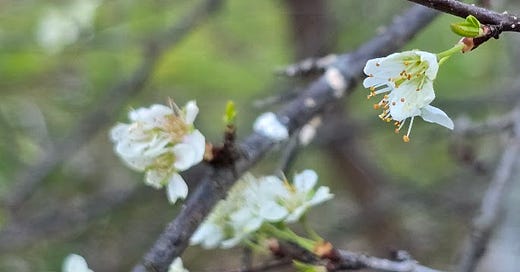









Just finished an ARC of The Correspondent by Virginia Evans. I've always loved the epistolary form, maybe because I so love to write and receive handwritten letters. This one is hugely engaging - comes out in late April, I believe. We're watching the new season of Yellowstone: 1923. Haven't watched the other versions, but Harrison Ford and Helen Mirren together are amazing.
Speaking of murder. The worst kind of murder. The murder of a 14 year old child. A murder driven by hate. It's amazing how many people haven't heard of Emmett Till. The current regime is trying to wipe out any reference to Emmett Till and any similar stories about this country's dark past. He was murdered in 1955 in a barn in the Mississippi delta region. The book I'm reading is called "The Barn: The Secret History of a Murder in Mississippi." It goes deep into the culture and history of Mississippi and the murder of Emmett Till. I know it's your birthplace Debbie so I think you will find it particularly interesting if you haven't already read it.